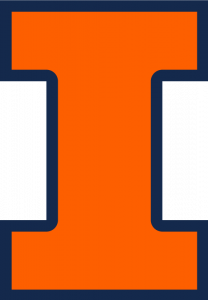
- Teacher: Christian Ramirez

- Teacher: Sean Ettinger
- Teacher: Christian Ramirez
- Teacher: Ruth Velasquez Estrada
- Teacher: Ruth Velasquez Estrada

- Teacher: Christian Ramirez
Research and Writing Seminar
LLS 490
Mondays, 2-4:20
133 1207 W Oregon
Dr. Gilberto Rosas
Associate Professor
Departments of Anthropology and Latina/o Studies
University of Illinois
Virtual Office Hours Wednesday, 1-3 and by appointment
@ https://illinois.zoom.us/s/3847761638?pwd=QXo5eE5lS1NLUXVjM0NTSVFUWFcwdz09#success
(217) 689-1434
grosas2@illinois.edu
Course Description
This course is designed for advanced majors in Latina/Latino Studies to engage in and complete an original research project. The course will guide students through the process of writing an
extended research paper relevant to Latina/Latino Studies. Students will apply selected theories
and methods that they learned in the prerequisite course (LLS 385: Theories and Methods of
Latina/Latino Studies).
Required Reading
Download from Moodle
Most of the readings are excerpted from the following sources:
Belcher, Wendy Laura. Writing Your Journal Article in Twelve Weeks: A Guide to Academic Publishing
Success. Thousand Oaks, CA: Sage Publications, Inc., 2009.
Booth, Wayne C., Gregory G., Colomb, Joseph M. Williams, Joseph Bizup, and William T. Fitzgerald.
The Craft of Research. 4th ed. Chicago: University of Chicago Press, 2016.
De Bono, Edward. Free or Unfree? Are Americans Really Free? Beverly Hills: Phoenix Books, 2007.
Graff, Gerald and Cathy Birkenstein. “They Say/I Say”: The Moves That Matter in Academic Writing.
3rd ed. New York: W. W.Norton and Company, 2017.
Williams, Joseph M. Style: Ten Lessons in Clarity and Grace. 7th ed,. New York: Longman, 2003.
Required Materials
* Binder/Folder to Keep Printed Readings Organized
* Class Notebook & Post-it flags, Pens/Pencils/Highlighters, etc. to take notes. I
recommend having a variety of colors to help you organize your writing.
* Preferred Writing Instrument—sometimes we will be writing in class, so bring a laptop
or a notebook and pens/pencils (if you use your class notebook; dedicate a separate
section for project writing)
Recommended Materials
* Computer/Laptop
* Printer — It is very difficult to learn how to write using only a laptop. I highly
recommend acquiring a printer or access to one because you will need to bring hard
copies of your senior project to every class.
Electronic Devices
No Cellphones. No Texting or Web-Surfing on laptops, etc., unless I specify otherwise.
Accommodations, Resources, Services
Many college classrooms and most courses have not been revised according to universal design,
but Disability Resources and Educational Services on campus offers various types of aid and
support for students who need accommodations. To obtain disability-related academic
adjustments and/or auxiliary aids, students with disabilities must contact both me and Disability
Resources and Educational Services (DRES) as soon as possible. To contact DRES, you may visit
1207 S. Oak St., Champaign, call 333-4603, e-mail disability@illinois.edu or go to the DRES
website. If you are concerned you have a disability-related condition that is impacting your
academic progress, there are academic screening appointments available on campus that can help
diagnosis a previously undiagnosed disability by visiting the DRES website and selecting “Sign-Up
for an Academic Screening” at the bottom of the page. Please provide me your DRES letter as
soon as possible. I do my best to accommodate those who need it, but the letter recommends
(not guarantees) specific accommodations.
** Academic Integrity **
PLAGIARISM
The University of Illinois has high standards of academic integrity set out in Article 1, Part 4 of
the University Student Code, which I uphold. All written coursework in this course is expected
to be your own, with all words and/or ideas from other sources fairly attributed. To use phrases
and/or ideas from any other source as if they were your own constitutes plagiarism. Submitting
your own work for more than one course without permission of both instructors can also
constitute plagiarism. The University Student Code sets out possible consequences of plagiarism
in coursework, ranging from failure on the assignment to suspension or dismissal from the
University. The Code specifies that ignorance of these standards is not an excuse. All students in
this class should familiarize themselves with the Code at www.admin.uiuc.edu/policy/code.
Documentation should follow the current Chicago Manual of Style or MLA form. The current (16th edition) Chicago Manual of Style can be found at http://www.chicagomanualofstyle.com/
home.html. The current MLA guide can be found at the Undergrad Library reference desk or, via
the Purdue website at http://owl.english.purdue.edu/owl/resource/747/01 If you have questions
about fair use or documentation, please do not hesitate to consult me.
Required Assignments
Attendance of Individual and Class Meetings—20%
Participation—10%
Draft #1—10%
Draft #2—10% (must incorporate draft #1 revisions)
Peer Review—5% (must have your own paper to participate)
Presentations—5%
Semester Paper—40%
Note: We will meet periodically as a class. Most week you are required to schedule an appointment and meet with me at my Room 339 at the LLS Department. We will discuss the progress of your work, following the schedule below. These meetings are indicated below as “Individual Meetings w/ Professor Rosas.”
“Class Meetings” are indicated accordingly.
Tentative Schedule of Readings and Assignments
*Subject to Change
1/24
Introductions and Logistics
WEEK 1
* The Pomodoro Technique
1/31
Assessing Credibility & Giving Credit
WEEK 2
Individual Meetings w/ Professor Rosas
* Download citation program: zotero.org (or something similar)
* Readings: Booth et. al. “Engaging Sources,” Graff and Birkenstein, “The Art of
Summarizing,” and Graff and Birkenstein, “The Art of Quoting”
*Write your research question(s)
*Bring notes on at least 2 new readings
*Write-up a Timeline (consider all your commitments, work, other classes, etc.)
2/7
Week 3
Arguments
Individual Meetings w/ Professor Rosas
*Check Timeline
*Write 3 to 4 sentences of what you plan to argue
*Bring more reading notes
2/14
Arguments
WEEK 3
Individual Meetings w/ Professor Rosas
* Readings: Belcher, “Advancing Your Argument (selection)”
*Write up ¼-1/2 page summary of your Project accomplishments
*Assess what needs to be done.
2/21
*Class Meeting
WEEK 4
Workshop
*Bring 3 written pages of your Project to class
2/28
WEEK 5
Individual Meeting w/ Professor Rosas
* Booth et. al., “Introductions and Conclusions”
*Draft an Introduction
2/28
WEEK 6
Class Meetings
Workshops
Bring 5-10 written pages of your project to class.
Collective Peer Review
3/7
WEEK 7
Individual Meeting
* Readings: TBD
Draft #1 Due
3/14
Spring Break
3/21
WEEK 10
Individual Meetings with Professor Rosas
* Readings: Williams, “Concision” and “Shape”
Rosas’ assessment of Draft
3/28
Revising
WEEK 11
Class Meeting
* Readings: Williams, “Elegance”
Project Update 10-15 minute In class Presentations. Include Power Points on your topic, your research questions, your findings, and any perceived shortcomings.
Collective Peer Review
4/4
Revising
WEEK 12
* Readings: TBA

4/11
CLASS MEETING
WEEK 13
* Readings: TBA
Collective Check-In and Challenges Discussion
4/18
In Class Meetings
Week 14
Presentations
Collective Review
4/25
In Class Meeting
Presentations
WEEK 15
* Presentations
5/2 Reading Day
WEEK 16
* Project Due TBD
- Teacher: Gilberto Rosas
- Teacher: Ruth Velasquez Estrada
